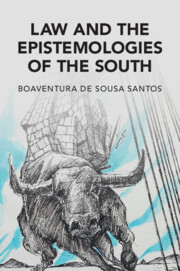Book contents
- Law and the Epistemologies of the South
- CAMBRIDGE STUDIES IN LAW AND SOCIETY
- Law and the Epistemologies of the South
- Copyright page
- Contents
- Preface
- Abbreviations
- Part One The Tragic Optimism of the Law: THE END OF A STORY
- Part Two Epistemologies of the South and the Law
- Part Three The Abyssal Law under the Mode of Abyssal Exclusion
- Part Four Real Legal Utopias: Interrupting the State
- Part Five Real Legal Utopias: Interrupting the Law
- Fourteen Law and Revolution in Portugal: Experiences of Popular Justice after the Carnation Revolution of 1974
- Fifteen Popular Justice in Cape Verde
- Sixteen The Landless Rural Workers’ Movement in Brazil and Its Struggles for Access to Law and Justice
- Seventeen The Law of the Excluded: Indigenous Justice and Plurinationality in Bolivia and Ecuador
- Eighteen Decolonising Justice and Democratic Peace in Colombia
- Part Six Real Legal Utopias: Interrupting Hegemonic Human Rights
- References
- Index
- Cambridge Studies in Law and Society
Sixteen - The Landless Rural Workers’ Movement in Brazil and Its Struggles for Access to Law and Justice
from Part Five - Real Legal Utopias: Interrupting the Law
Published online by Cambridge University Press: 07 August 2023
- Law and the Epistemologies of the South
- CAMBRIDGE STUDIES IN LAW AND SOCIETY
- Law and the Epistemologies of the South
- Copyright page
- Contents
- Preface
- Abbreviations
- Part One The Tragic Optimism of the Law: THE END OF A STORY
- Part Two Epistemologies of the South and the Law
- Part Three The Abyssal Law under the Mode of Abyssal Exclusion
- Part Four Real Legal Utopias: Interrupting the State
- Part Five Real Legal Utopias: Interrupting the Law
- Fourteen Law and Revolution in Portugal: Experiences of Popular Justice after the Carnation Revolution of 1974
- Fifteen Popular Justice in Cape Verde
- Sixteen The Landless Rural Workers’ Movement in Brazil and Its Struggles for Access to Law and Justice
- Seventeen The Law of the Excluded: Indigenous Justice and Plurinationality in Bolivia and Ecuador
- Eighteen Decolonising Justice and Democratic Peace in Colombia
- Part Six Real Legal Utopias: Interrupting Hegemonic Human Rights
- References
- Index
- Cambridge Studies in Law and Society
Summary
This chapter analyses the main legal and political strategies used by the Landless Rural Workers’ Movement (MST) in its struggle for law and justice in Brazil. It explains why these legal and political strategies are pursued jointly, and the extent to which they may contribute towards making the law and legal system more sensitive to the claims and social struggles of these workers, particularly those related to the issue of land. It shows that access to law and justice presupposes a broad political process of social transformation. This includes the creation of more substantial forms of social justice and a developing awareness that the law contains many internal contradictions that may eventually be used in the interests of the socially oppressed classes. Social movements fighting for land reform have only become aware of this fact in recent decades but the knowledge has enabled them to supplement their political strategies (such as mass land occupations) with innovative judicial and legal strategies. The resulting interconnection between legal and political initiatives has momentarily strengthened the movement’s objectives, largely due to the intervention of the people’s lawyers, who have liaised between the state legal system and the social movement. In the course of this process, the hegemonic law currently in force has been put to the test.
Keywords
- Type
- Chapter
- Information
- Law and the Epistemologies of the South , pp. 481 - 502Publisher: Cambridge University PressPrint publication year: 2023

